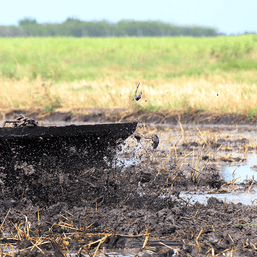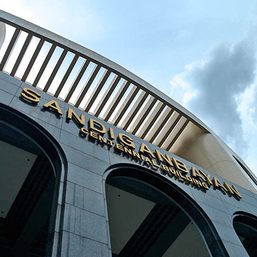SUMMARY
This is AI generated summarization, which may have errors. For context, always refer to the full article.
![[Newsstand] Is Duterte corrupt?](https://www.rappler.com/tachyon/2021/11/duterte-corrupt-november-9-2021-sq.jpg)
Last week, in yet another broadside at Senate blue ribbon committee chair Dick Gordon and Senate Minority Leader Frank Drilon, President Duterte called them corrupt. His proof? He is president; they are not.
“Alam mo, sa totoo lang, Gordon pati Drilon, hindi ako aabot sa presidency, from my mayorship sa presidency, kung corrupt ako kagaya niyo.” It sounds like a forceful statement, but it is only a bold, unsupported assertion. “You know, truth to tell, Gordon and also Drilon, I would not have reached the presidency from my mayorship if I were corrupt like you.” The two senators, among those who have taken the lead in the Senate investigation of the Pharmally pandemic profiteering scandal, have since defended themselves.
In his Talk to the People on November 3, the President did not offer any proof or present any evidence. He merely pointed to the fact that he was able to reach the presidency, as though only the uncorrupt get to Malacañang. To add a trademark touch of authenticity, he hinted that he was guilty of other crimes, but vigorously denied any wrongdoing “about corruption and money.”
This is not the first time President Duterte has said something exactly like this: “Maybe other things may be said about me, but not money.”
Only sin
On September 27, 2018, for instance, he recalled before an assembly of professionals what he had said to the generals. “As I told the military, what am I guilty of [anong kasalanan ko]? Did I steal even one peso? Go, try and prove it. Did I prosecute somebody that I sent to jail? My only sin [ang kasalanan ko lang] are the extrajudicial killings.”
I share the view that President Duterte really does believe he has not stolen even a single peso from the government since reaching the Palace. This is his current self-image, and it is robust enough to accommodate his own corruption in the past.
On June 29, 2017, to emphasize what he called his hatred of corruption, he admitted that he had once been corrupt himself. “I hate corruption. I am not being holier-than-thou [Hindi ako nagmamakalinis (sic)]. I also stole a lot but it’s all used up. So it’s gone. Son of a bitch, I don’t … but corruption is really out during my term.”
Let us, for the sake of argument, agree that Mr. Duterte, as President, has not been crass enough as to directly receive money for the abuse of government power or resources. (Unlike, say, Joseph Estrada, who received a P180 million commission for forcing the Social Security System make a stock purchase.) Does this mean that the President is not corrupt?
Corrupt practices
The Anti-Graft and Corrupt Practices Act defines 11 corrupt practices of public officers. By his own statements against self-interest and his own conduct, President Duterte has committed at least half of them.
1. “Persuading, inducing or influencing another public officer to perform an act constituting a violation of rules and regulations duly promulgated by competent authority …”
By barring his Cabinet officials from testifying at the ongoing Senate investigation into Pharmally, President Duterte is not only standing in the way of the truth; he is also forcing his officials to violate both R.A. 3019 and a Supreme Court ruling. And by condoning and even actively encouraging Solicitor General Jose Calida to enter his security agency in government biddings (an instance of this first corrupt practice), the President also created the conditions for Calida to commit the second kind of corruption.
2. “Directly or indirectly requesting or receiving any gift … wherein the public officer in his official capacity has to intervene under the law.”
“Why should I fire him?,” the President asked once, in defense of Calida. “Anything in government as long as there is bidding, there is no problem, that’s OK if he won the bidding.” This embrace of an unethical practice is both nonchalant and seriously wrong.
3. “Directly or indirectly requesting or receiving any gift … from any person for whom the public officer, in any manner or capacity, has secured or obtained, or will secure or obtain, any Government permit or license …”
Pastor Apollo Quiboloy founded a lucrative religious enterprise in Davao City, where Mr. Duterte was famously mayor for over 20 years; its cathedral is in the city’s Buhangin district. But listen to the President wax rhapsodic about his special constituent’s spending habits. “Every time Pastor buys something, he buys two at a time. One of them is for me, for sure.” He was talking about real estate properties and SUVs.
4. “Causing any undue injury to any party … in the discharge of his official administrative or judicial functions through manifest partiality, evident bad faith or gross inexcusable negligence.”
The prime example is the PhilWeb takeover. In 2016, President Duterte hammered away at PhilWeb, its “oligarch” majority owner, and at the very concept of electronic gaming. “The plan really is destroy the oligarchs that are embedded in government. I’ll give you an example, publicly—Ongpin, Roberto.” Under intense pressure from the President’s manifest partiality, Ongpin sold his majority stake to Greggy Araneta, Ferdinand Marcos’ son-in-law; afterwards, President Duterte suddenly recovered a taste for the possibilities of electronic gaming. This unsubtle takeover shocked the business community with its brazen display of bad faith.
5. “Directly or indirectly having financial or pecuniary interest in any business, contract or transaction in connection with which he intervenes or takes part in his official capacity …”
The President’s common-law wife, Honeylet, has a deserved reputation for hard work and business savvy. But even Mr. Duterte cannot hide the obvious: “When she came home, she had saved up for capital, she franchised another one and then ventured into the meat business. The meat being sold here [in Davao] is hers. Besides, who would try to compete against the wife of the mayor or President? Ah, now she’s really rich.”
6. “Knowingly approving or granting any license, permit, privilege or benefit in favor of any person not qualified for or not legally entitled to such license, permit, privilege or advantage, or of a mere representative or dummy of one who is not so qualified or entitled.”
The Senate investigation into Pharmally was what triggered President Duterte, yet again, to attack the investigators. He bristled at Gordon’s calling him an “attorney” for the firm, but it has become increasingly clear, even to the President’s political allies, that the underfunded, unqualified, unusually lucky company gained an unfair advantage from the President’s own men. His continued lawyering for Pharmally only means he approved (of) the contracts.
7. “Divulging valuable information of a confidential character, acquired by his office or by him on account of his official position to unauthorized persons, or releasing such information in advance of its authorized release date.”
The President had a damaging habit of selectively releasing matrices or narcolists to hit back at potential or actual enemies. Turns out this kind of state-sponsored doxxing is a corrupt practice too.
The case can be made, then, that President Duterte did in fact engage in corrupt practices. But he didn’t learn it on the job; when he was city prosecutor, he was already planting evidence. When he was mayor, he used the threat of EJKs to deliberately keep people in line. Because his mayorship was his campaign calling card, we can reasonably say that, yes, he reached the presidency through corruption. – Rappler.com
Veteran journalist John Nery is a columnist and editorial consultant of Rappler.
Add a comment
How does this make you feel?




There are no comments yet. Add your comment to start the conversation.